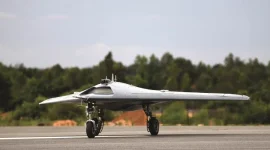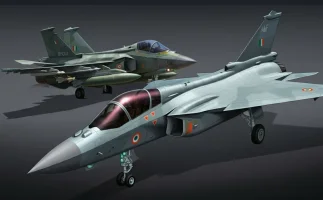- Views: 4K
- Replies: 35
India needs a collaborative effort from its private sector industries to master the critical technology required for advanced jet engines, according to Baba Kalyani, Chairman and Managing Director of the Kalyani Group.
Speaking recently, the head of the major Indian defence manufacturing conglomerate stressed that developing the 'hot core' section of these engines is essential for the nation's self-reliance, particularly for the planned 110kN thrust engine intended for the Advanced Medium Combat Aircraft (AMCA) program.
The hot core, which includes the compressor, combustion chamber, and turbine, is considered the most vital part of a jet engine. It operates under extremely high temperatures and pressures to generate the necessary thrust for flight.
Mr. Kalyani pointed out that while India has advanced significantly in defence production, mastering this complex engine section remains a challenge. He noted that this technology is often closely guarded by global leaders such as General Electric, Rolls-Royce, and Safran.
"India is yet to master the hot core section of the jet engine," Mr. Kalyani stated, highlighting the need to develop this capability to support indigenous fighter aircraft like the AMCA.
Mr. Kalyani proposes that a consortium of private Indian companies should pool their expertise and financial resources to overcome the technological hurdles involved in creating the 110kN engine. This engine is crucial for the AMCA, a fifth-generation stealth fighter jet currently under development by the Defence Research and Development Organisation (DRDO) and Hindustan Aeronautics Limited (HAL).
The required 110kN thrust is notably higher than the 98kN generated by the GE F414 engines used in the Tejas Mk2 aircraft, indicating the need for a significant advancement in domestic engine technology.
Progress on the AMCA project continues, with goals set for its first flight within the coming years, further emphasizing the urgency for engine development.
According to Mr. Kalyani, such a partnership would achieve two main goals. Firstly, it would allow participating companies to gain invaluable experience and understanding of the complex technologies within the engine's hot core.
Secondly, it would establish India's private industry as a significant contributor to the global jet engine supply network. "If many private sector companies come together, the 110kN engine development can become a learning platform," he explained. This approach, he believes, would enable India to not only supply components initially but eventually produce complete engines independently.
Several Indian companies, including Godrej Aerospace, Mahindra Aerospace, and Tata Advanced Systems, which are already manufacturing aircraft components, could potentially partner with the Kalyani Group and others to form this development consortium.
This collaborative model could potentially incorporate technology transfer arrangements with established international engine manufacturers, similar to past agreements, ensuring Indian firms develop their own intellectual property and manufacturing capabilities. The Indian government's 'Aatmanirbhar Bharat' (Self-Reliant India) initiative actively encourages such indigenous development in the defence sector.
"Once we crack this, we won’t just be a supply chain for engines—we’ll be building them from scratch," Mr. Kalyani affirmed. Achieving this capability aligns with India's strategic objective to become a major defence exporter and significantly reduce its dependence on foreign engine imports, which currently cost the nation billions of dollars annually. Success in this venture would position Indian companies to compete effectively in the global aerospace market.



